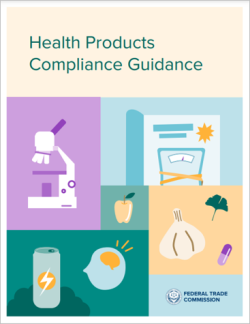Technically we can’t categorize these notable FTC staff publications of 2023 as “best sellers” because they’re available at no charge. But we can say that “best sellers” – our description of law-abiding advertisers, marketing professionals, and the attorneys who represent them – make it a habit to read the FTC’s to-the-point business publications and follow the advice they offer. To count yourself among the better sellers of 2024, consider guidance from these titles published or updated in 2023.
CAN-SPAM Act: A Compliance Guide for Business. If you use email marketing in your business (and who doesn’t?), the FTC revised its CAN-SPAM advice to reflect developments in the marketplace. Remember that all consumers – including subscribers and members – can opt out of receiving marketing emails. It’s the responsibility of the business to provide that notice clearly and to honor consumers’ choices within 10 business days.

FTC CARS Rule: Combating Auto Retail Scams – A Dealers Guide. “Here in my car I feel safest of all.” We can’t provide legal assurance for new wave music pioneer Gary Numan’s 80s lyric, but the FTC’s CARS Rule is an important step toward empowering consumers – and honest dealers – by combating auto retail scams, including illegal bait-and-switch tactics and hidden junk fees. Before the Rule’s July 30, 2024, effective date, read the new compliance guide to learn more about what the CARS Rule means for dealers and prospective car buyers.
AI and Your Business blog series. When the FTC Business Blog launched in 2010, we promised readers “a minimum of ho-hum, a maximum of how-to, and as little yadda yadda yadda as a legal website can manage.” Of all the digital ink spilled in 2023 on the topic of artificial intelligence, we think the ongoing AI and Your Business blog series dissects the issues with a fresh, frank, and fluent perspective you’ll find nowhere else.
Informing Businesses about the INFORM Consumers Act and What Third Party Sellers Need to Know About the INFORM Consumers Act. OK, they may not be serial page turners like the Twilight saga – and we’re certainly not comparing companies covered by the INFORM Consumers Act to vampires and werewolves. But if you’re looking for an introduction to what the new law means for your business, these two FTC publications are a good place to start. Just as Edward and Jacob were different, the INFORM Consumers Act acknowledges the different roles online platforms and third-party sellers play in adding more transparency to consumer transactions.
Using Consumer Reports: What Landlords Need to Know. If you’re in the real estate business or have clients who are, the FTC’s “renovated” guidance on the use of consumer reports merits your attention. Of course, the foundational principle remains the same: Landlords that use consumer reports to make tenant decisions must comply with the Fair Credit Reporting Act (FCRA).
Protecting Kids from Stealth Advertising in Digital Media: An FTC Staff Perspective. This thought-provoking staff paper recommends that to help avoid injury to children, businesses, social media influencers, and others who promote products online to kids should clearly separate advertising from entertainment, educational, and other content. Another important observation: For younger kids in particular, disclosures are unlikely to be effective.

Scams and Your Small Business: A Guide for Business. The tactics of crooks who target small businesses morph with the marketplace. So we revised our guidance to focus on some scams du jour, including business and government imposters, ransomware, and “business coaching” outfits that promise big bucks – often to retirees, veterans, or others looking to supplement their income – but take the money and run. What’s more, small business owners speak many languages and scammers are conversant in all of them. That’s why the FTC has published this guide for businesses in English, Spanish, Simplified Chinese, Korean, and Vietnamese. (Also check out ftc.gov/languages for new consumer resources in multiple languages.)
Collecting, Using, or Sharing Consumer Health Information? Look to HIPAA, the FTC Act, and the Health Breach Notification Rule. 2023 has been an important year in health privacy and this revised FTC-HHS guide has advice to help your company comply with the law. And in case you missed it, this FTC Business Blog post – Protecting the privacy of health information: A baker’s dozen takeaways from FTC cases – discusses some major law enforcement developments you need to know about.

Franchise Fundamentals blog series. If you’re thinking about buying a franchise, don’t make a move without considering the advice in the FTC’s five-part Franchise Fundamentals series. The blogs start by debunking some persistent myths about buying a franchise, including the inaccurate assumption that owning a franchise means you’ll “be your own boss.” The series also offers guidance on researching franchise opportunities, reading between the lines of the Franchise Disclosure Document, seeking out people who can offer an independent perspective on franchise opportunities, and reporting concerns if things go awry.
FTC’s Endorsement Guides: What People Are Asking. June 2023 was a trifecta for businesses that use endorsements in their marketing. The FTC issued final revisions to the Endorsement Guides, asked for public comment on a proposed new Rule on the Use of Consumer Reviews and Testimonials, and updated this key compliance resource for businesses, endorsers, and members of the advertising industry.

Health Products Compliance Guidance. Just missing our 2023 list with a December 2022 release date, the FTC’s revised guide merits an ICYMI second look. Of course, the publication offers key advice to companies making health claims, but don’t let the “Health Products” title fool you. With advice on foundational FTC principles – for example, identifying express and implied representations, disclosing qualifying information, making disclosures clear and conspicuous, and substantiating advertising claims – the take-away points in this updated publication are still relevant to advertisers that don’t sell health products.
